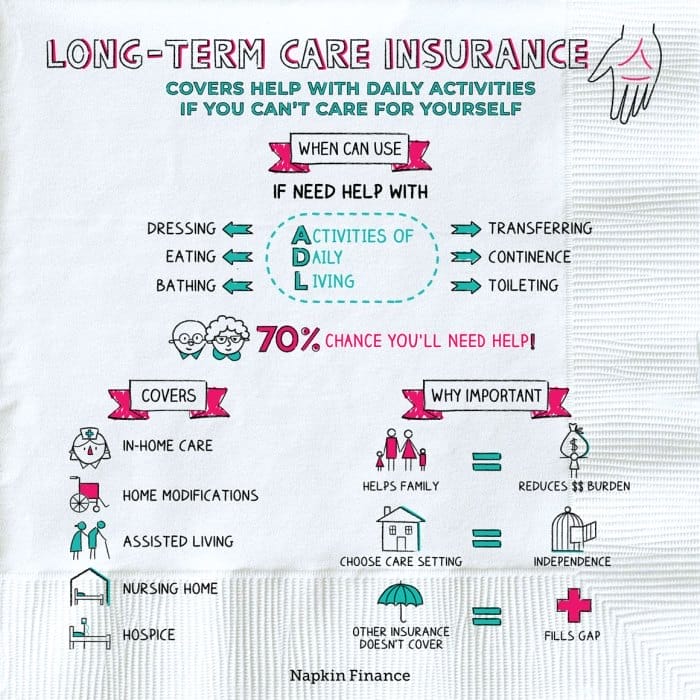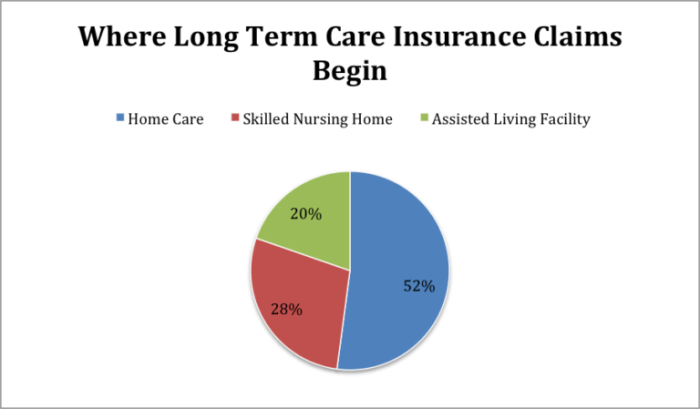As we age, the prospect of needing long-term care becomes increasingly real. With the rising costs of assisted living facilities and home health aides, having long-term care insurance can provide a financial lifeline during challenging times. However, filing a claim can be a daunting task, filled with complexities and potential pitfalls.
This comprehensive guide will equip you with the knowledge and strategies to navigate the claims process effectively. From understanding your policy and gathering documentation to appealing denied claims and managing costs, we’ll cover everything you need to know to ensure a successful outcome.
Documenting Your Claim

Establishing a solid paper trail is crucial for a successful long-term care insurance claim. Effective documentation not only substantiates the necessity for care but also streamlines the reimbursement process.
Organizing Medical Expenses
Compile a comprehensive list of all medical expenses associated with long-term care. This detailed record should include:
- Doctor’s visits and consultations
- Hospital stays
- Nursing home or assisted living facility charges
- Home health care services
- Medical equipment and supplies
- Prescription medications
- Transportation costs related to medical appointments
Supporting Documentation
Gather all supporting documentation related to the medical expenses. This includes:
- Receipts and invoices
- Medical bills
- Explanation of Benefits (EOB) statements from insurance companies
- Medical records, including test results, diagnoses, and treatment plans
- Caregiver logs or diaries
- Correspondence with healthcare providers and insurance companies
Timeline of Events
Create a timeline that Artikels the events leading up to the need for long-term care. This timeline should include:
- The date of the accident or illness that resulted in the need for care
- The date the individual was admitted to a long-term care facility or began receiving home health care services
- The dates of any changes in the individual’s condition or level of care
- The dates of any appeals or disputes with the insurance company
A well-documented claim with detailed records, supporting evidence, and a clear timeline strengthens the case for reimbursement and expedites the claims process.
Filing the Claim
Filing a long-term care insurance claim can be a complex process, but by following these steps, you can ensure that your claim is processed efficiently and accurately.
The first step is to contact your insurance company and request a claim form. The claim form will typically require you to provide information about the policyholder, the policy, the medical condition that is causing the need for care, and the care that is being provided.
Necessary Documents
In addition to the claim form, you will need to include the following documents with your claim:
- A copy of the policy
- Proof of identity for the policyholder
- Medical records that document the medical condition that is causing the need for care
- Bills and receipts for the care that is being provided
Tips for Completing the Claim Form
When completing the claim form, it is important to be accurate and complete. Here are a few tips:
- Use clear and concise language.
- Be specific and provide as much detail as possible.
- Attach copies of all relevant documents.
- Review the claim form carefully before submitting it.
Once you have completed the claim form and gathered the necessary documents, you can submit your claim to your insurance company. The insurance company will then review your claim and make a decision on whether to approve it.
Appealing a Denied Claim

If your long-term care insurance claim has been denied, don’t give up. You have the right to appeal the decision. The appeal process can be complex, but with the right information and documentation, you can increase your chances of success.
The first step is to understand the reasons for the denial. Your insurance company should provide you with a written explanation of the denial. Review the explanation carefully and make sure you understand why the claim was denied.
Preparing Your Appeal
Once you understand the reasons for the denial, you can start preparing your appeal. The appeal should be submitted in writing and should include the following information:
- A copy of the denial letter
- A statement explaining why you believe the claim should be approved
- Any additional documentation that supports your claim
Your statement should be clear, concise, and persuasive. It should address the specific reasons for the denial and provide evidence to support your position.
Supporting Documentation
In addition to your statement, you should also submit any additional documentation that supports your claim. This may include:
- Medical records
- Caregiver notes
- Financial records
- Witness statements
The more documentation you can provide, the stronger your appeal will be.
Sample Appeal Letter
Here is a sample appeal letter that you can use as a starting point:
To: [Insurance Company Name]
From: [Your Name]
Date: [Date]
Subject: Appeal of Long-Term Care Insurance Claim Denial
Dear Sir or Madam,
I am writing to appeal the denial of my long-term care insurance claim. I believe that the claim should be approved for the following reasons:
- [Reason 1]
- [Reason 2]
- [Reason 3]
I have enclosed the following documentation to support my appeal:
- [Document 1]
- [Document 2]
- [Document 3]
I believe that the information and documentation provided clearly demonstrate that I meet the criteria for coverage under my long-term care insurance policy. I request that you reconsider your decision and approve my claim.
Thank you for your time and consideration.
Sincerely,
[Your Name]
Once you have submitted your appeal, the insurance company will review your request. The review process can take several weeks or even months. If your appeal is denied, you may have the right to file a lawsuit against the insurance company.
Working with Your Insurance Company

Effective communication with your insurance company is crucial for a successful claim process. The insurance adjuster assigned to your case plays a significant role in processing and evaluating your claim. Here are strategies for communicating effectively and resolving disputes with your insurance company.
Strategies for Effective Communication
Open and honest communication is essential. Provide clear and accurate information about your claim, including medical records, bills, and other supporting documentation. Be responsive to requests for additional information or documentation from the insurance company.
- Use clear and concise language.
- Be organized and provide all necessary documentation.
- Be patient and persistent. It may take time for your claim to be processed.
- Keep a record of all communications with the insurance company.
The Role of an Insurance Adjuster
The insurance adjuster is responsible for evaluating your claim and determining the amount of benefits you are entitled to receive. The adjuster will review your medical records, bills, and other documentation to assess the validity of your claim.
- The adjuster may also contact your doctor or other healthcare providers to obtain additional information.
- The adjuster will make a decision on your claim based on the evidence they have gathered.
- If you disagree with the adjuster’s decision, you can appeal the decision.
Resolving Disputes and Reaching a Settlement
If you disagree with the insurance company’s decision on your claim, you can appeal the decision. The appeals process typically involves submitting additional documentation and evidence to support your claim. You may also have the opportunity to present your case to an independent reviewer.
- If the appeals process is unsuccessful, you may need to file a lawsuit against the insurance company.
- Mediation or arbitration may also be an option for resolving disputes.
- The goal is to reach a fair and equitable settlement that compensates you for your losses.
Managing Long-Term Care Costs

Planning for long-term care expenses is essential for individuals and families. This section delves into effective strategies for managing these costs and ensuring financial stability.
Understanding the financial implications of long-term care is crucial. Start by creating a comprehensive budget that accounts for potential care expenses, such as nursing home stays, assisted living, or home care services. Include costs associated with medications, medical supplies, and any necessary home modifications.
Exploring Cost-Saving Options
Consider exploring options that can help reduce long-term care costs without compromising the quality of care. Home care services can provide assistance with daily tasks, allowing individuals to remain in their own homes for longer. Assisted living facilities offer a supportive environment with various amenities and healthcare services, often at a lower cost than nursing homes.
Tips for Managing Costs Over Time
Managing long-term care costs over time requires careful planning and strategic decision-making. Here are some tips to help you navigate these expenses:
- Plan Ahead: Start saving early to cover potential long-term care expenses. Consider purchasing long-term care insurance or investing in a dedicated savings account.
- Review Your Policy Regularly: If you have long-term care insurance, review your policy annually to ensure it meets your changing needs and coverage limits.
- Seek Government Assistance: Explore government programs and benefits that may provide financial assistance for long-term care, such as Medicaid or the Veterans Administration.
- Negotiate Costs: Don’t hesitate to negotiate costs with healthcare providers or long-term care facilities. Ask about discounts or payment plans that can help reduce your expenses.
Managing long-term care costs requires careful planning and proactive decision-making. By creating a budget, exploring cost-saving options, and implementing effective strategies, individuals and families can navigate these expenses and ensure financial stability.
Legal Considerations

Understanding your legal rights as a long-term care insurance policyholder is crucial. State laws and regulations govern these policies, providing protection and guidance for policyholders.
Each state has its own set of laws and regulations governing long-term care insurance policies. These laws are designed to protect policyholders and ensure that they receive the benefits they are entitled to.
Policyholder’s Legal Rights
- Review and Understand Your Policy: Carefully review your policy to understand its terms, conditions, and limitations. Pay attention to details such as coverage amounts, exclusions, and claim procedures.
- Know Your Rights to File a Claim: You have the right to file a claim for benefits under your policy if you meet the eligibility criteria. Make sure you understand the process for filing a claim and the documentation required.
- Right to Appeal a Denied Claim: If your claim is denied, you have the right to appeal the decision. The appeal process typically involves submitting additional information and documentation to support your claim.
- Protection Against Unfair Practices: State laws prohibit insurance companies from engaging in unfair or deceptive practices. These laws protect policyholders from being misled or mistreated by insurance companies.
Seeking Legal Assistance
In some cases, you may need to seek legal assistance to protect your rights under your long-term care insurance policy. An attorney can help you:
- Review your policy and explain your rights and options.
- Assist you in filing a claim or appealing a denied claim.
- Represent you in court if necessary.
If you are considering filing a claim for long-term care insurance benefits, it is important to understand your legal rights and options. Consulting with an attorney can help you ensure that your rights are protected and that you receive the benefits you are entitled to.
Additional Resources

Navigating the long-term care insurance claims process can be challenging. Several resources are available to assist policyholders in understanding their rights, filing claims, and appealing denied claims.
These resources include government agencies, advocacy groups, support organizations, online resources, and downloadable guides.
Government Agencies
- National Association of Insurance Commissioners (NAIC): The NAIC is a resource for consumers with questions about long-term care insurance. They provide information on state regulations, complaint handling, and policyholder rights.
- Centers for Medicare & Medicaid Services (CMS): CMS provides information on Medicare and Medicaid coverage for long-term care services.
- Social Security Administration (SSA): The SSA provides information on Social Security benefits that may be available to individuals with disabilities.
Advocacy Groups
- American Association for Long-Term Care Insurance (AALTCI): AALTCI is a non-profit organization that provides information and support to long-term care insurance policyholders.
- Consumer Reports: Consumer Reports provides information and ratings on long-term care insurance policies.
- Medicare Rights Center: The Medicare Rights Center provides information and assistance to Medicare beneficiaries.
Support Organizations
- Alzheimer’s Association: The Alzheimer’s Association provides information and support to individuals with Alzheimer’s disease and their caregivers.
- American Parkinson Disease Association (APDA): APDA provides information and support to individuals with Parkinson’s disease and their caregivers.
- National Multiple Sclerosis Society: The National Multiple Sclerosis Society provides information and support to individuals with multiple sclerosis and their caregivers.
Online Resources
- LongTermCare.gov: This website provides information on long-term care insurance, including tips on choosing a policy and filing a claim.
- Medicare.gov: This website provides information on Medicare coverage for long-term care services.
- SSA.gov: This website provides information on Social Security benefits that may be available to individuals with disabilities.
Downloadable Guides
- A Consumer’s Guide to Long-Term Care Insurance: This guide from the NAIC provides information on choosing a long-term care insurance policy and filing a claim.
- Medicare & You: This guide from CMS provides information on Medicare coverage for long-term care services.
- Social Security Disability Benefits: This guide from the SSA provides information on Social Security benefits that may be available to individuals with disabilities.
Case Studies

Examining real-life scenarios of successful long-term care insurance claims can provide valuable insights into the claims process and challenges faced by policyholders. These case studies showcase the significance of proper documentation, effective communication with insurance companies, and the resilience of individuals navigating the long-term care insurance landscape.
One such case study involves a 72-year-old policyholder named Sarah who suffered a debilitating stroke that left her requiring round-the-clock care. Despite the initial denial of her claim by the insurance company, Sarah’s family meticulously gathered medical records, doctor’s reports, and witness statements to support her case.
They also enlisted the help of an experienced long-term care insurance attorney who specialized in claim disputes. After a thorough review of the evidence, the insurance company reversed its decision and approved Sarah’s claim, ensuring she received the necessary financial support for her ongoing care.
Overcoming Challenges
Case studies also highlight the challenges policyholders may encounter during the claims process. One common challenge is the strict interpretation of policy terms and conditions by insurance companies. Policyholders must carefully review their policies to understand the specific criteria and definitions used to determine eligibility for benefits.
They should also be prepared to provide detailed documentation to support their claim, including medical records, doctor’s notes, and assessments from qualified healthcare professionals.
Another challenge lies in the lengthy and complex claims process. Insurance companies may request multiple rounds of documentation and information, which can be overwhelming for policyholders and their families. It is crucial to maintain open communication with the insurance company, respond promptly to requests for information, and seek assistance from an insurance professional or attorney if necessary.
Best Practices
Case studies also offer valuable insights into best practices for filing and managing long-term care insurance claims. These include:
- Maintaining Organized Records: Keep all relevant medical records, doctor’s reports, and insurance correspondence in a centralized and easily accessible location.
- Understanding Policy Terms: Familiarize yourself with the specific terms and conditions of your long-term care insurance policy to ensure you meet all eligibility requirements.
- Seeking Professional Assistance: Consider consulting with an experienced long-term care insurance attorney or insurance professional who can guide you through the claims process and advocate for your rights.
- Communicating Effectively: Maintain open communication with the insurance company, respond promptly to requests for information, and clarify any ambiguities in a timely manner.
- Appealing Denied Claims: If your claim is denied, carefully review the denial letter and consider filing an appeal. You may need to provide additional documentation or evidence to support your case.
Last Word

Filing a long-term care insurance claim can be a complex and time-consuming process, but with careful preparation and attention to detail, you can increase your chances of a successful outcome. Remember to keep meticulous records, communicate effectively with your insurance company, and seek legal assistance if necessary.
By following the tips and strategies Artikeld in this guide, you can navigate the claims process with confidence and secure the benefits you deserve.
Common Queries
What are some common reasons for long-term care insurance claims to be denied?
Common reasons for denied claims include failure to meet the policy’s eligibility criteria, incomplete or inaccurate claim forms, and lack of supporting documentation.
How can I appeal a denied long-term care insurance claim?
To appeal a denied claim, you should submit a written appeal to your insurance company within the specified timeframe. Include a copy of the original claim, any additional supporting documentation, and a persuasive argument explaining why the claim should be approved.
What are some strategies for managing long-term care costs?
To manage long-term care costs, consider exploring options such as home care, assisted living facilities, or adult day care. Additionally, look into government programs and community resources that may provide financial assistance.
Where can I find additional resources and support for filing a long-term care insurance claim?
Numerous resources are available to assist you, including government agencies, advocacy groups, and support organizations. Additionally, online resources and downloadable guides provide valuable information and guidance.



